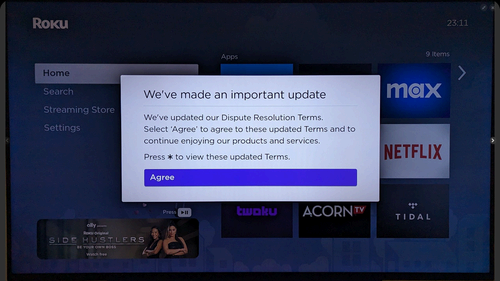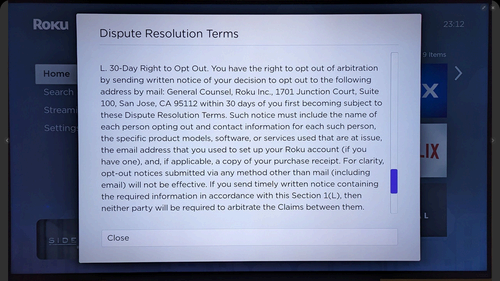
Edgar Cervantes / Android Authority
TL;DR
- Many Roku users were locked out of their devices until they agreed to new dispute resolution terms.
- The new terms require users to go through a mandatory “Meet-and-Confer” process with Roku before pursuing legal action.
- Users have a 30-day window to opt out but can do so only by mailing a written notice.
Roku users across the country were met with a rude awakening this week when their TVs and streaming devices became unusable. The culprit? Roku’s firm “my way or the highway” stance, which requires users to consent to its updated dispute resolution terms — essentially holding their streaming device hostage until they do.
According to TechCrunch, the company had earlier sent out a notification email outlining changes to the terms, noting that continued use of Roku’s products or services would constitute agreement to these terms. However, users only discovered the new terms when their devices were disabled and have now taken to the Roku community forums to voice out their frustration.

A closer examination of the updated terms reveals the addition of an “Informal Dispute Resolution” process. This new section mandates that any legal grievances against the company must first be presented to Roku’s legal team via a “Meet-and-Confer” call. Following this, Roku promises to extend a “fair, fact-based offer of resolution.”
The intent behind this additional step appears to be to further insulate the company from direct legal action. Although this change was made in the previous fall season, it has only recently been enforced, with users now being notified through this compulsory agreement process.
While users have the right to opt out of the new terms, the process is far from user-friendly. They have a mere 30-day window from the date the terms came into effect for them (which could be when they were notified or 30 days after the February 20th silent implementation) to send a written notice to Roku’s legal department. You can find the details of the opt-out process in the image below.

Unlike many phones, apps, and services that allow continued use or limit you to the current version until you agree, Roku offers no such grace period.
While Roku’s tactics may appear to be heavy-handed, they highlight a larger issue — our collective apathy towards the legalese buried within terms and conditions. This reminds us to be more mindful of the agreements we enter and to take a moment to understand the implications before surrendering our rights (and sometimes, even our TV access). After all, who wants to be held hostage by their entertainment device?

